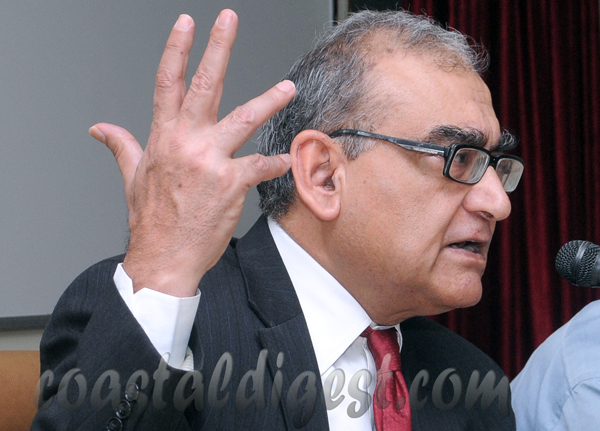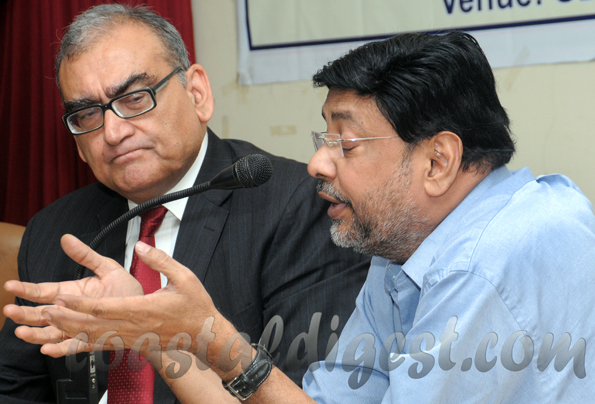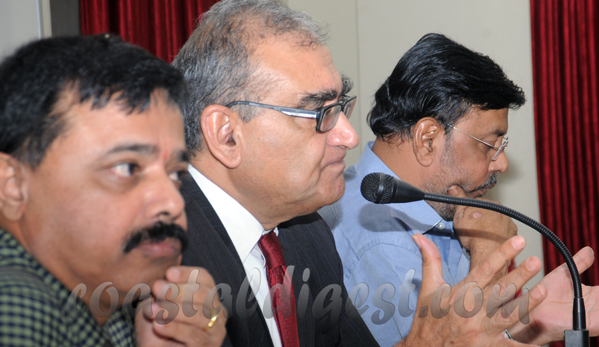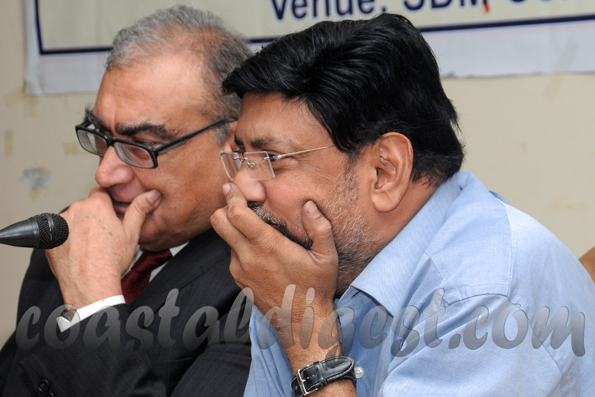
Mangalore, December 5: Media houses and journalists are not above the law and hence the Press Council of India (PCI) needs to be given more teeth to bring about meaningful regulation said Justice Markandeya Katju, Chairman, PCI, and former judge of the Supreme Court of India.
Speaking at an interaction programme with media persons at the SDM College of Law and Management in Mangalore on Wednesday, Mr. Katju said that he has been pressing the government to bring about an amendment to the Press Council Act and provide it with more powers. “At present the Press Council has a chairman alongside 28 other members of which 20 are representatives of the press who are elected by press organizations. The decisions taken by the Council are through a democratic process and the chairman is not a dictator. If an amendment is brought about in the Act and broadcast media are also included into the Council, there will be 40 representatives from the media. The Council should be given punitive powers to punish media houses and journalists who cross the line and deceive people. Newspapers do not even respond to the notices sent by the Council in connection with violation of journalistic ethics. The Council must have powers to suspend broadcast and publishing license. The media cries about its freedom quoting the Article 19(a) of the Constitution but does not want to come under the ambit of 'Reasonable Restrictions' of the same constitution. Some media have resorted to blackmailing but they get away without punishment. IPC procedure and laws will take 20 years to decide on punishments. When Bar Councils can take action against advocates who are guilty of wrongdoings, when medical fraternity has its own statutory body and so do the Chartered Accountants, why should media not have a body which has powers to punish the guilty immediately. Media is not above the law/ In a democracy, everyone should be accountable. I am not in favour of control. I am in favour of regulation”, he said.
'Farmer suicides and poverty more important than Sachin Tendulkar'
Mr. Katju expressed his concerns over the plummeting standard of journalism and media ethics and said that media has forgotten its primary responsibility of serving the people and highlighting the real issues plaguing the country. “Freedom of the press holds value only when it is for the good of the society. If press uses its freedom to deceive people, spread casteism and communalism and divert attention from core issues like price rise, poverty, unemployment etc, that freedom does not hold any value and deserves to be suppressed. Sachin Tendulkar's 100th hundred and Kareena Kapoor's wedding has become more important for media today. Will India beating Pakistan in a cricket match eliminate the country's poverty or solve its other problems? 512 accredited journalists covered a Lakme Fashion parade but farmer suicides hardly get that coverage. 48% of India's children are malnourished and Gujarat has the highest percentage of child malnutrition in the country but these issues are not important for media”, he said.
The former Apex court judge also stressed on media's role in encouraging rational thinking. “TV channels are busy discussing doomsday and the end of the world nowadays. Media needs to spread scientific ideas and combat superstitions”, he said.
'Committee to check 'paid news'
Speaking on the 'Paid News' practice and media campaigns during elections, Mr. Katju said “Paid news is rampant today. We have constituted a four member committee which will be going to Gujarat to keep an eye on the 'paid news' practice with elections round the corner. Every social activity needs to be regulated”. Mr. Katju said that he is not against political parties owning media and TV channels. “Anybody can own media as per the law. I am not against making money. But at the same time there is a need to act responsibly”, he said.
'Journalists deserve proper wages'
Mr. Katju also said that journalists deserve proper minimum wages. “There is tremendous exploitation of journalists by media owners. Media persons are also humans and they must have job security. At this point of time when prices are sky-rocketing, the journalists are being paid a few thousands which is not right”, he said.
'Cauvery issue needs a scientific solution'
The Former Supreme Court judge said in response to a query that the issue of Cauvery water dispute needs a proper scientific solution. “Both Karnataka and Tamil Nadu have coastlines and hence an attempt has to be made to convert sea water into fresh water to satify the water needs through inexpensive methods. It may take time as research needs to be done in this regard but until then mediation is the way forward”, Mr. Katju said, adding that he is willing to chair a committee of mediators to help both parties come to a consensus.











Comments
Add new comment